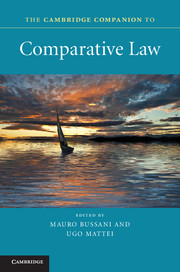Book contents
- Frontmatter
- Contents
- Contributors
- Abbreviations
- Preface
- Part I Knowing comparative law
- 1 Comparative law and neighbouring disciplines
- 2 Political ideology and comparative law
- 3 Economic analysis and comparative law
- 4 Comparative law and anthropology
- 5 Comparative law and language
- Part II Comparative law fields
- Part III Comparative law in the flux of civilizations
- Index
- References
3 - Economic analysis and comparative law
Published online by Cambridge University Press: 05 May 2013
- Frontmatter
- Contents
- Contributors
- Abbreviations
- Preface
- Part I Knowing comparative law
- 1 Comparative law and neighbouring disciplines
- 2 Political ideology and comparative law
- 3 Economic analysis and comparative law
- 4 Comparative law and anthropology
- 5 Comparative law and language
- Part II Comparative law fields
- Part III Comparative law in the flux of civilizations
- Index
- References
Summary
Introduction: what is law and economics?
The economic analysis of law investigates the answer to two fundamental questions: (i) a positive question concerning the impact of laws and regulations on the behaviour of individuals, in terms of their decisions and the implications for social welfare; and (ii) a normative question concerning the relative advantages of laws in terms of efficiency and social welfare. To answer these two questions, law and economics applies the methodology of microeconomic analysis. Microeconomic analysis makes certain simplifying assumptions, namely that individuals respond to incentives and make their decisions in a rational way, comparing costs and benefits, given all the available information. More recent developments have relaxed the assumption of full rationality to adopt a more realistic limited rationality assumption in the context of the so-called behavioural law and economics. Another assumption is that the welfare of society is measured by aggregating the individual welfare of its members.
Law and economics, or the economic analysis of law, is today one of the most influential scholarly methodologies in American legal thinking. The origins of the field can be traced back to the eighteenth and nineteenth centuries, for example, with the writings of Bentham, but economic analysis of law gained notoriety with the articles of Nobel laureates Ronald Coase and Gary Becker, and the books of Guido Calabresi and Richard Posner. In the last forty years, law and economics has expanded to all areas of the law, starting with those with more obvious economic significance (antitrust and regulation, tax, corporate governance, bankruptcy, employment) to the hard core of legal studies (contracts, tort, property, crime, and civil and criminal procedure) and new areas of the law (such as family law, environmental law, or constitutional structure). Comparative law is no exception. In fact, the extension of recent applications of economic methodology to comparative law has raised the question of the extent to which economic analysis of comparative law is by now a new, independent discipline.
- Type
- Chapter
- Information
- The Cambridge Companion to Comparative Law , pp. 57 - 72Publisher: Cambridge University PressPrint publication year: 2012
References
- 2
- Cited by

